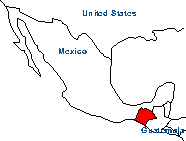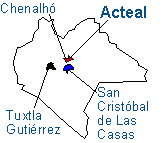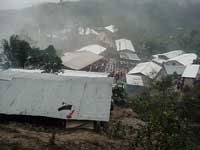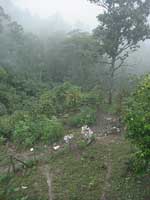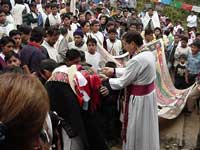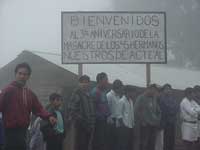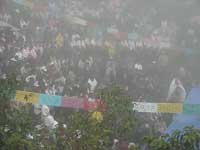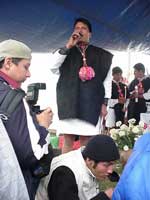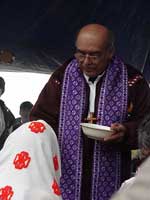
In the Footsteps of Martin Luther King: |
|
|
Marc Becker
Reflections on the relevance of Dr. Martin Luther King, Jr.'s speech "Our God Is Marching On!" to the current situation in Chiapas, Mexico. I want to invite you to a place called Chiapas, the southernmost state in Mexico. Southern Mexico shares many similarities with the southern United States. Historically, a small white population has dominated a large so-called "minority" population and has grown wealthy off of the exploitation of their labor. In the U.S., enslaved Africans were forced to work on cotton plantations. In Mexico, Maya Indians caught in an equally abusive system of debt peonage were forced to labor on mahogany plantations. In the United States, Jim Crow laws assured that Africans would never enjoy full exercise of their political rights or earn fair wages for their labor. In Mexico, the enactment of the North American Free Trade Agreement (NAFTA) in 1994 similarly meant that the Maya would never know anything but poverty and exclusion. In both cases, these subjugated peoples have fought for their civil rights-the right for land and jobs, access to governmental resources, the right to vote, and the right to be treated like civilized human beings. Centuries of injustice and repression resulted in the emergence of an armed insurrection led by the Zapatista Army for National Liberation (EZLN). In declaring war on the Mexican government on January 1, 1994, poet-philosopher Subcomandante Marcos observed that one could disagree with the violent methods that the Zapatistas had chosen but not with the justness of their struggle. Government and paramilitary forces responded to the uprising with attacks on autonomous communities, resulting in the harassment, displacement, and massacre of Indigenous peoples. Today, rather than talking about the Zapatistas I would like to focus on another group called Las Abejas-the Bees. The Bees are a Christian pacifist group located in the Tzotzil-Maya speaking municipality of Chenalhó. While they share the sentiments and objectives of the better known Zapatista movement, they are committed to nonviolent methods including demonstrations, non-cooperation, active resistance, and civil disobedience to achieve social justice in Chiapas. Much like Martin Luther King noted in Montgomery 35 years ago, the Bees have "faith that nonviolence and its power can transform dark yesterdays into bright tomorrows" in the struggle for peace, democracy, justice, and dignity for all Mexicans. On December 22, 1997, the Bees gathered for a second day of prayer and fasting in a wooden church in the small, isolated community of Acteal when a paramilitary force called Mascaras Rojas (Red Masks) arrived on the road overlooking the village. Paramilitary forces, much like the Ku Klux Klan in the United States, represent the oppressive arm of the exploitative dominant society that seeks to deny the Maya Indians their civil rights. They receive training, arms, and support from military and police forces, and act in coordination with these state forces (some of who have trained at the U.S. Army School of the Americas) to defend elite political and economic interests through intimidation and repression of the civilian population. Starting in the church and then following the wailing of infants to flush out those who fled to hide in the bushes, the paramilitary forces cowardly attacked the unarmed inhabitants with high-powered U.S.-supplied automatic weapons. Hours later when they had finished their methodical attacks, 45 people including 21 women (5 of whom were pregnant), 15 children and 9 men lay dead in a ravine, and 26 more were injured. Three years later with the government still not having heard the Mayas' cry for justice, 250 Bees set out on a 65-day, 1400-kilometer walking pilgrimage from Acteal to Tepeyac, the Basilica of Guadalupe in Mexico City. Similar to King's 54-mile march from Selma to Montgomery in 1965, the Bees's pilgrimage was "for a just peace and a life with dignity for our people." Like Blacks in Alabama 35 years earlier, the Maya no longer want to be systematically excluded politically and economically from the rest of Mexico. They prayed for a peaceful transition to democracy and that their friends and neighbors might not fall into the temptation of armed insurrection, and that the government might not return to the temptation of violent repression. The Bees arrived back in Acteal just in time for the 3rd anniversary commemoration of the massacre. Like King noted after the 1965 march, their feet were tired but their souls were rested. In a cold drizzle and with a heavy fog, 1500 people, including Maya Indians as well as others from throughout Mexico and around the world, gathered for a reenactment of the massacre with wooden guns and firecrackers popping. The survivors of the massacre were standing just above the scene, wearing sashes indicating that they were present during the massacre. Former Bishop Samuel Ruiz observed that "The heavens are pouring tears over us, but they are just to nourish us with their hope." Alonso López, speaking both in his native Tzotzil-Maya and Spanish, led the commemoration. A Maya priest offered prayers for the dead from an altar decorated with candles and flowers, with incense wafting over the crowd. A choir of displaced Bees sang hymns. Far from being victims, the Mayas have emerged from these experiences empowered and even more deeply committed to their struggle for social justice. Felipe Arizmendi, the current bishop of Chiapas, noted that "the brothers and sisters of Acteal are not alone, this presence demonstrates that the blood shed so arbitrarily and unjustly three years ago was not in vain." Significant for the Mayas, however, was the return of retired Samuel Ruiz (whom the Maya call Tatic, meaning "Father") who during his 40 years as bishop of San Cristóbal fought tirelessly for the rights of the Indigenous peoples, much like Bartolomé de Las Casas, the first bishop of San Cristóbal did almost 500 years before. In his homily, Ruiz noted that Acteal has "become a cry of hope" and "their voices have grown and reach not only through spaces but also through time far from this place." Like King, their legacy will echo throughout history. Volcanos provide a good metaphor for Latin America, both because of their incredible beauty as well as the ever present threat of unbridled violence. Just in time for the Acteal commemoration, the giant Popocatepetl volcano awoke from its 500-year slumber and threatened to cover Mexico with ash. After the commemoration, Popo settled back down into a more peaceful state, but seemed to leave behind the message that unless justice comes to this land violence and destruction may very well be the result. Upon arrival in Montgomery, King pled for a continuing commitment to nonviolence. He proclaimed that "we must come to see that the end we seek is a society at peace with itself, a society that can live with its conscience." The Bees are following in Dr. Martin Luther King's footsteps to achieve that goal. How long will it take? |
Third Anniversary Acteal Commemoration (December 2000)
